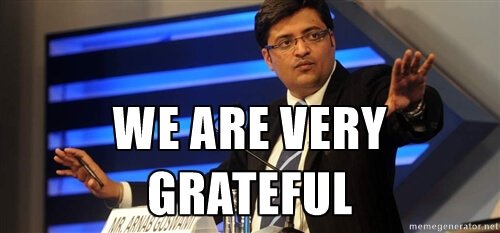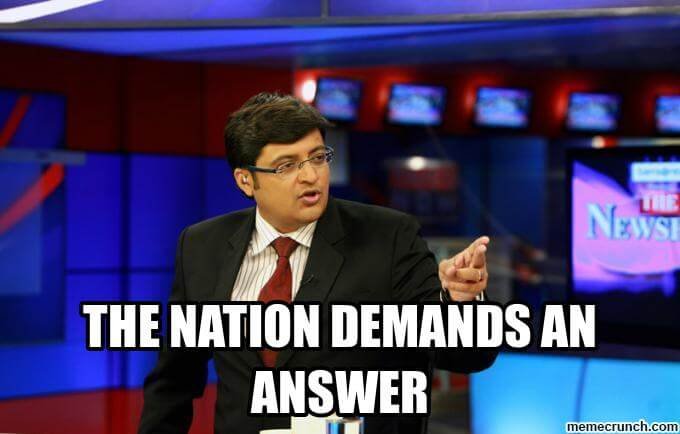Arnab Goswami has largely set the template for private news channels in India.
It is to him that we owe screens that scream headlines; it is to him we owe the screens that are a riot of colours (and not in a good way); it is to him we owe the debates that we prefer to watch on mute. With the exception of NDTV, almost every other TV news channel has adopted the same shrill, sensational strategy that has helped Times Now climb to the top of the TRP pile.
But the difference between all those TV channels and Times Now is that the latter has Arnab — the man who would ask the tough questions without even batting an eyelid; the man who would make politicians apologise to his reporters; a man who would chase an ‘exclusive’ story (even if it was one that was broken by some other news organisation but adopted by Times Now) to the ends of the planet.
But despite all this, people still liked watching him because it seemed like he had his heart in the right place. During the interview with Modi on Monday, however, that facade melted away.
“The achievement,” as one of my editors used to say, “is not in getting the interview. Instead, it is in the questions you ask after you get the interview.”
From the start, it was clear that this was an interview that Arnab was grateful for. He started off by saying this: “So I would first like to thank you and am very grateful for the opportunity.”
The next question again began with this: “I am very grateful and our viewers will be very grateful also Mr Modi because they want to hear your views on a range of subjects.”
Grateful for what? Really. What was Arnab grateful for? Why should we be grateful to Modi? In his own words, Modi is here to serve us and not the other way round. So why does he build these walls and not give regular interviews?

Usually you don’t see the PM give interviews because he is simply not prepared to take the risk. There are no press conferences either. The possibility of tough questions cropping up — remember Modi walking out of the Karan Thapar interview? — is very high and in the age of social media, simply not worth it. The most senior political figures have a new way of dealing with tough interviews… they avoid them altogether. So when Modi gave his okay, you had a good idea of what was coming your way.
But here, with Arnab, we expected answers to some questions that have truly gnawed at Indians for the two years that Modi has been in charge. Instead, we got, what was summed up by many, as little more than PR.
Legendary news anchor David Frost, who gained notoriety for his interviews with US President Richard Nixon and Secretary of State Henry Kissinger, once spoke about what it means to interview someone:
“It is not the questions that matter, it is the answers. Some form of relationship is needed between the two people. It may be mutual respect or dislike. It may be asking questions that have not been asked before and of course listening to the answers but above all, there needs to be a rapport of some kind between the two people and ideally you ask questions that they haven’t answered before or they give new answers to the questions.”
There was a relationship on display here as well. Modi was clearly in-charge. He spoke and Arnab listened, without ever resorting to the kind of cross-questioning that he is famous for.
Still, this was a bit too much. There was giggling, there was adulation, there were long monologues, indeed… there was anything but the questions the nation really needed Arnab to ask.
Who really says stuff like: ‘By the way Mr Prime Minister it was a fantastic speech,’ or ‘You were laughing and cracking jokes while you delivered the speech which was very unique.’ or ‘Mr Prime Minister, if I may say so, between May 8 and now, you are speaking as straight as you did before you took over as Prime Minister.’
Even when he spoke about Raghuram Rajan, there was no follow-up question on why it took Modi so long to respond to the controversy. Neither were there any questions about JNU, about the hyper-nationalists that are plaguing India, about the Gau Rakshaks, about Dadri, about saffronisation, about the ‘dream’ of a Hindu rashtra or even about much-criticised ministers like Smriti Irani.
Instead, he chose to go around issues and talk about the issues that Modi wanted to speak about… so much so that many on Twitter took to calling it Mann Ki Baat 2.0.
If anything, Arnab did journalism and ‘his’ people a great dis-service. Perhaps, a part of him may be now wishing that he had not got the interview at all. Well, at least, that is what we are hoping.
Sometimes it is the job of the interviewer to give voice to the frustrations and anger of the viewer, and it is something Arnab usually does. But yesterday, in front of Modi, he failed. Badly. And it was rather sad to see him tom-tomming it.


















